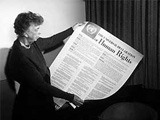Transitions and Traumas: Universality and the West
9 Dec 2008
By Olaf Henricson-Bell for ISN
In the 60 years since the adoption of the United Nations Universal Declaration of Human Rights (UDHR), the question of universality has turned on notions of opposition and ownership. For much of the Cold War period, human rights were formally and ideationally divided between the proprietorial visions of East and West and challenged on the basis of the irrelevance of ‘Western’ rights to the decolonized world. The UDHR was both produced and hampered by these tensions, and the fortunes of human rights in its parent organization, the United Nations, have continued to bear the same representative qualities to this day.
For most of the post-World War II period, an artificial distinction between civil and political rights on the one hand and economic, social and cultural rights on the other has undermined the claims of the UDHR to speak for, and to, humanity as a whole. At the same time, and perhaps more significantly, universality was challenged by relativist critiques that international human rights are specific rather than universal because they emerged from a Western tradition and do not represent the values of other cultures.
In the face of such criticisms, a mountain of scholarship emerged to make claims to the philosophical, legal and anthropological universality of human rights. This work sought to identify the cross-cultural relevance of human rights. Such identifications could then be used to reject relativism as the last refuge of despots bent on denying freedoms to those under their control. In many ways such presentations were very accurate, and they no doubt captured the motives of a great many postcolonial dictators, as the fall-out from the debate over ‘Asian-values’ has made clear.
This discourse, however, created a climate in which criticism of, or concepts from outside, the Western-driven human rights regime were interpreted as a challenge to the principle of universality itself.
The nature of this debate seemed to change with the Vienna World Conference on Human Rights of 1993. It was there that a global consensus emerged over both the indivisibility of rights and their applicability to all cultures. This ‘triumph of human rights’ - heralded most notably at the time in Francis Fukuyama’s End of History - did not, however, long survive the return of division over its associated concepts.
In fact, challenges to universality are as central as ever to debates on human rights as the UDHR marks its 60th birthday. For one, mounting evidence exists that the West is no longer able to control the UN human rights agenda. Many diplomatic and academic observers ascribe this to a resurgent relativism, where the universal character of established human rights are being questioned by states that seek to undermine the basis of the international normative framework. These voices point to the dominance of the Organization of the Islamic Conference in the Human Rights Council and to the increasing assertiveness of Russia and China in blocking criticism of repressive regimes like Zimbabwe and Myanmar in the Security Council.
Journalists and think tanks have also picked up on this new ‘threat to universality’, as evidenced in a recent report by the European Council of Foreign Relations, A Global Force for Human Rights, arguing that "the EU is increasingly unable to get the rest of the world to support a vision of a global order in which international institutions defend individual human rights….[P]owers that oppose universal human rights are able to muster broad coalitions to back their positions."
The ‘newness’ of this threat is convincing, and the report provides a wealth of statistical evidence to underline what is anecdotally visible to everyone engaged in the struggle for international human rights. However, a conclusion drawn from this analysis that conflates problematizing the Western-led development of human rights with an outright opposition to universality is less convincing.
In fact, this conclusion is flawed.
It is flawed not because all states are ‘human rights friendly’ and supportive of the development of the international human rights system but because it mistakenly identifies different approaches as existential threats to the system itself. This error is worsened by the underlying notion that human rights are a fixed set of concepts that stand or fall as one. Such a contention is unjustifiable in light of the evolution of human rights to date or when compared with the desired amendments to the regime that are the avowed policy of countries around the world; one need think only of the EU’s advocacy against the death penalty or debates surrounding sexual orientation. Human rights have always been as much a project as a doctrine.
Viewed from this position, the present day threat to universality is not, therefore, that outside challenges could bring the existing edifice crashing down, but that it could be torn apart from within by preventing additions or alterations from being made.
This is not to say, of course, that Western states should meekly accept ideas that run counter to their understanding of rights. Rather, they should engage in debates on issues like freedom of expression and non-discrimination, in which emerging voices now have a clearer vision of what contributions they can make. The seriousness of these debates, rather than their outcome, is the test of how universal we want human rights to be.

